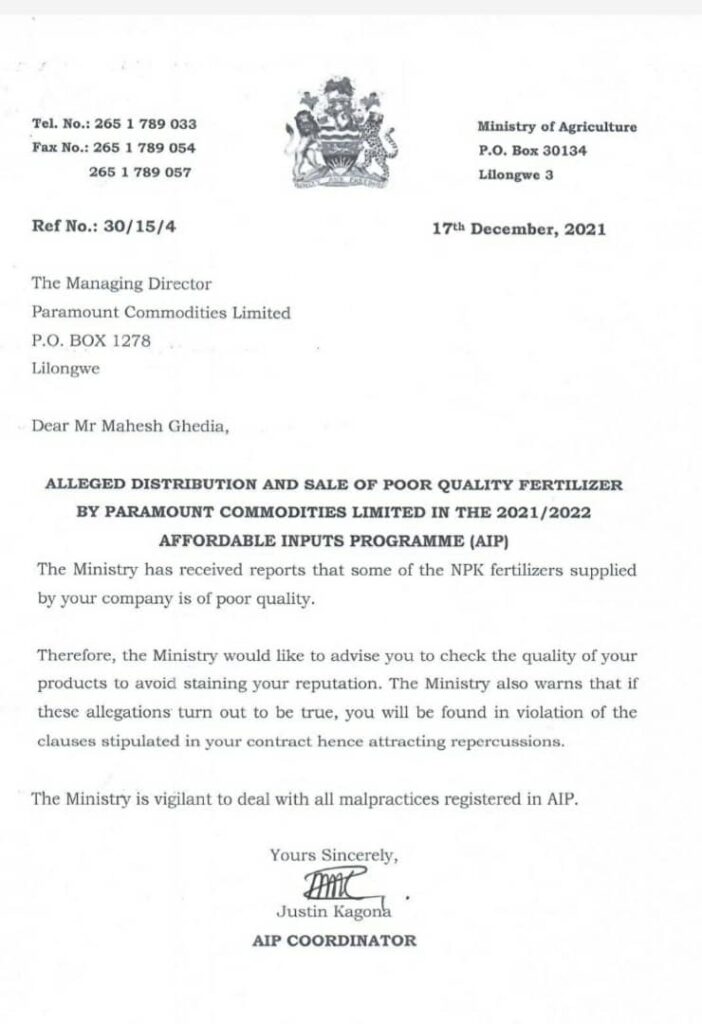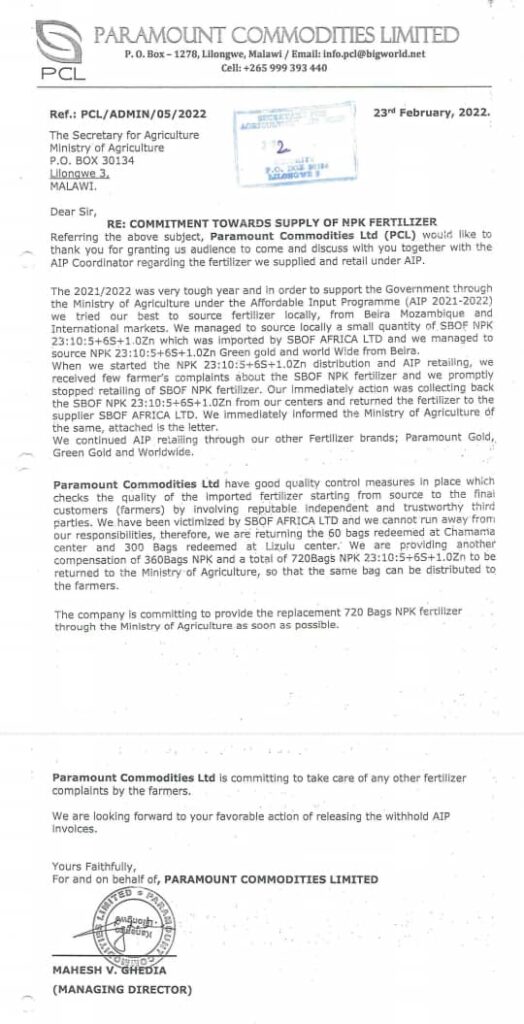By Iommie CHIWALO


The Affordable Input Programme contractor, Paramount Commodities Limited who was on the verge of being barred from doing business with Malawi government for supplying poor quality fertiliser in the 2021/22 farming season has implicated its local supplier SBOF Africa Ltd.
In the last farming season farmers complained about poor quality fertiliser especially NPK which has now been discovered that it was supplied by SBOF Africa Ltd which was sub contracted by Paramount Commodities Limited on behalf of Malawi government.
But through commitment letter in expressing interest to supply 2022/23 AIP, Paramount Commodities Limited Managing Director Mahesh Ghedia said that his company has good quality control measures in place which checks the quality of imported fertiliser from source to the final customers by involving reputable independent and trustworthy third parties.
“We have been victimised by SBOF Africa Ltd and we cannot run away from our responsibilities, therefore, we are returning the 60 bags redeemed at Chamama Center and 300 bags redeemed at Lizulu Center. We are providing another compensation of 360 bags of NPK and a total of 720 bags NPK to be returned to the ministry of agriculture so that the same bags can be distributed to the farmers,” reads the commitment letter from Mahesh.
In his letter he has justified his company’s decision to source fertiliser from a local supplier based on the fact that 2021/22 farming season was tough economically hence forced to source the commodity within Malawi and Mozambique.
Mahesh clarified that when his company received complaints from farmers about NPK fertiliser supplied by SBOF Africa Ltd, his company moved in swiftly.
“Our immediate action was collecting back the SBOF NPK from our centers and returned the fertilisers to the supplier SBOF Africa Ltd. We immediately informed the Ministry of Agriculture of the same,” he said.
His commitment letter to supply 2022/23 AIP fertiliser comes as another direct response to a letter written by AIP Coordinator Justin Kagona where the Agriculture Ministry was advising the company to check quality of its products to avoid staining its reputation.
“The ministry also warns that if these allegations turn to be true, you will be found in violation of the clauses stipulated in your contract hence attracting repercussions. The Ministry is vigilant to deal with all malpractices registered in AIP,” Kagona said in his previous letter.
But Paramount Commodities Limited Managing Director Mahesh Ghedia responded that Directors of his company have resolved not to transact with SBOF Africa Ltd in future.
“The batch of SBOF NPK has spoiled the good name of our company and we have stopped distribution of SBOF NPK to all AIP retailing centers with immediate effect,” reads the previous letter from Mahesh which is in our possession.
Already, the market has been flooded with fake or outright substandard fertilizer as unscrupulous business owners are trying to make a killing out of the plight of Malawians.
Recently, a clip depicting farmers in Nsathe Kasungu district opened eyes of many vulnerable and unsuspecting farmers that the tricksters are back in town in readiness for the 2022/23 growing season. In the said video farmers manage to prove that what they thought was Urea fertilizer was in fact lime-coated anti-hill soil.
Meanwhile AIP for 2022/23 has already been facing obstacles especially in the procurement side whereby recently Malawians woke up to learn that authorities wanted to buy fertiliser from a United Kingdom based company which has just been discovered that the company is just a mere butchery.
An inquiry into the same by a joint Parliamentary Committee shows that the decision was influenced by President Lazarus Chakwera’s close ally Moses Khombe Banda.
In the email sent by Khombe to secretary to Treasury Macdonald Mafuta Mwale, former Secretary for Agriculture Sandram Maweru, Budget Director Loyce Chilimsungwi and one Caroline Mathusamy has found that Khombe is the one who persuaded the Malawi government to pay UK based company the K750 million Kwacha as commitment fee.
An extract of his email to the senior Malawi government officials as presented by joint Parliamentary Committee, was more of a directive.


